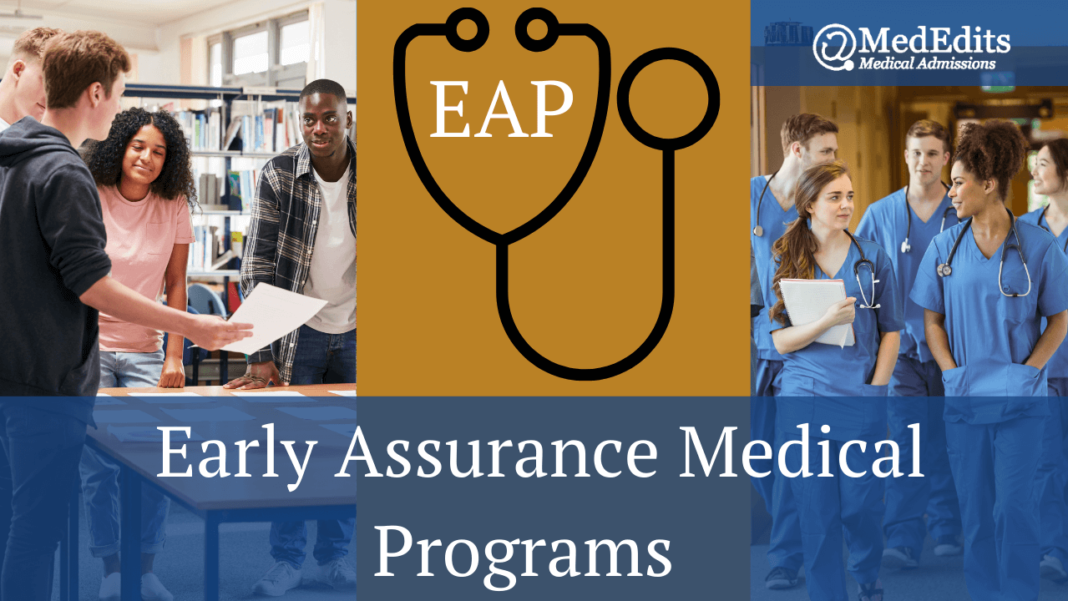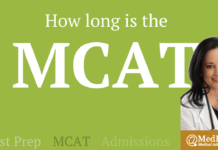Early Assurance Medical Programs (2025): A Comprehensive Guide
For students hoping to become physicians, the road is long and challenging. Most of the time, it means four years at an undergraduate college, possibly a gap year or two, four years of medical school, and a several-year residency.
While there aren’t any shortcuts to gain the skills and knowledge and requirements it takes to get into medical school, there are some ways for exceptionally talented and focused students to make the process more efficient and less anxiety-provoking. One of these routes is an early assurance program (EAP).
At MedEdits, we work with students who successfully apply and get accepted to EAPs around the country so we understand what a strong candidate “looks like.”
What is an early assurance medical program?
EAPs are geared toward undergraduate students who have proven that they are both high achieving and committed to pursuing a career in medicine. Through these pathways, future physicians apply to medical schools that have these programs, usually in their second year of college, and are accepted much earlier than their peers.
Acceptance to an EAP has many advantages. Not only can students alleviate the anxiety of having to wait until they’re close to graduation to learn their fates, but they can also bypass many of the usual requirements — even, in some cases, having to take the MCAT before admission.
What makes you a strong candidate for an EAP?
In order to be accepted into an EAP, you must have an exemplary academic record, including both a high GPA and coursework consistent with premed requirements. You must also be willing to put in the effort to maintain a strong GPA — there are often requirements about keeping your grades up after you’re admitted into the program.
The vast majority of students accepted to EAPs have a strong foundation that is already established in high school in both clinical medicine and research. The successful EAP applicants with whom we work at MedEdits have the same level of extracurricular achievement as traditional medical school applicants.
Typical requirements
The requirements for EAPs vary by program, but generally speaking, they consist of the following:
Undergraduate Institution
Some EAPs are reserved for their own undergraduate institutions or from select undergraduate institutions.
Prerequisite courses
Usually, students are expected to complete at least five pre-med courses prior to acceptance, such as biology, chemistry, and organic chemistry. Some programs may be more specific about what coursework students should complete.EAP programs require that students have taken only some of those prerequisites before applying.
Minimum GPA
Your GPA must be at or above a certain threshold in the first two years of undergraduate college in order for you to be accepted into an EAP. The majority of students who are accepted to EAP programs have earned nearly straight As in the first semesters of college.
Test scores
While taking the MCAT is often not required, some programs may ask for your SAT or ACT scores. Again, successful EAP applicants have earned ACT and SAT scores in the 99th percentiles.
Additional materials
Applicants should also submit materials that are required for admission into traditional medical programs, such as:
- Personal Statement
- Supplementary Essays
- Letters of Recommendation
- Activities, Extracurriculars, and Medically-Related Work Experience (volunteering, shadowing, research, and so on)
Interviews
All EAP programs require interviews which are now held virtually.
How to improve your chances of admission to an EAP
Look into program requirements early.
If you’re interested in applying to an EAP, make sure you look into the requirements for admission early — within your first year of college or before — so you can ensure that you’re on track.
Note that some EAPs only accept students from the undergraduate college within the larger university or partner or affiliated colleges or universities.
Focus on completing the necessary coursework and maintaining a high GPA.
Once you know the requirements, spend your first two years of college fulfilling them, all while maintaining a strong GPA. Remember, too, that you’ll usually need to show activities that offer evidence that you’ll succeed in a rigorous program and beyond, so this will require balance.
Seek out guidance.
A pre-med advisor at your college or outside of it can help you ensure you’re fulfilling your requirements and offer guidance to help you on the road to an EAP or admission to medical school later on.
Is an EAP right for you?
There are a lot of advantages to an EAP, but it’s not necessarily the best path for everyone. Here are some signs that it’s the right choice for you.
You have a strong academic record.
There is usually a minimum GPA for admission to an EAP, and it’s high. If your academic record is exemplary and you have taken the necessary pre-med courses, then you could be well prepared for this type of program.
You want to explore courses, subjects, and activities outside of your immediate comfort zone.
Remember: an EAP doesn’t mean you’ll start medical school early. Instead, it means that you’ll be able to finish your undergraduate years without admission to med school looming over your head. You won’t need to worry too much about your GPA — although in many cases, you’ll still need to maintain a certain minimum — and you can get outside your comfort zone by exploring different types of courses.
You can also join activities you haven’t tried yet since you won’t have to devote your time to building medicine-related extracurriculars and working on your med school applications.
You’d like to save money on the application process.
One of the most appealing aspects of EAPs, aside from alleviating your anxiety, is the time and money you’ll save on the medical school admissions process. You won’t have to apply to multiple schools and pay the application fees or go through several rounds of interviews. In some cases, you may not even have to study for or take the MCAT at all.
You know beyond a shadow of a doubt that you want to be a physician.
Of course, this means you’ll have to set on your future career far earlier than your peers. While you’re usually not required to attend an EAP if you’re admitted, the effort of applying probably isn’t worth it if you’re not positive that medicine is the right path for you. So, if you are sure, then go ahead and apply!
List of Early Assurance Medical Programs in the US








